As an experienced family law attorney here in Texas, I’ve seen divorces start off uncontested and end up hotly contested, and others begin fiercely contested only to end up settling in an uncontested manner. So I like my clients to understand the pros and cons of both a contested vs uncontested divorce. Sean’s story demonstrates why.

“I can’t wait to get her in front of that judge Chris and expose all the lies she’s been telling herself and everybody else about me,” Sean began. “I didn’t pick this fight, but I’m going to finish it.”
“Hmm, I understand Sean. Divorce can make you want to fight but that’s not always the best course. Do you think we can settle upon all the important terms without needing to go to court?” I asked him.
“Maybe, I mean we don’t have any kids or own a house, but I want to see her in court. I want to see if she’ll put her hand on that Bible, swear to tell the truth, and then lie through her teeth in front of the judge,” Sean said.
“Yes, I can understand that desire Sean, but I don’t think family court judges would feel that would be productive use of their time. Maybe you can consider an uncontested divorce. It might be more practical for you,” I told him. “It would save you time and money while reducing your stress.”
“Really, you’ve got my attention, how is that?” he asked.
“Sean, please let me go over our guide to a contested vs. uncontested divorce. I’ll give you a general overview of divorce laws and procedures here in Texas and focus on the differences between fighting it out in court and coming to an agreement on your own,” I said. Legal procedures for contested divorces are usually more complex than those for uncontested divorces, often involving additional steps like discovery, mediation, and potentially a trial.
“Let’s give it a shot. I should know more about my options. My only knowledge so far comes from what I’ve seen on TV,” Sean said.
Deciding Divorce: Contested vs Uncontested
Breaking up is never easy. Beyond the emotional turmoil, there are legal complexities that can impact finances, kids and your overall well-being. If you’re getting a divorce in Texas, like Sean, deciding whether to go with a contested or uncontested divorce is crucial.
Contested and uncontested divorces are different in cost, time and process. Uncontested divorces are faster and cheaper. Contested divorces may involve long legal battles and court final decisions that have control over the outcome. This guide combines information from multiple sources so you can make sense of this big life change. Consulting experienced divorce and family lawyers can help you navigate the complexities of the divorce process, ensuring you understand your options and receive comprehensive support throughout the proceedings.
Disclaimer: This article is for general information only and not legal advice. Consult a Texas divorce lawyer for your specific situation.
Overview of Divorce Laws in Texas
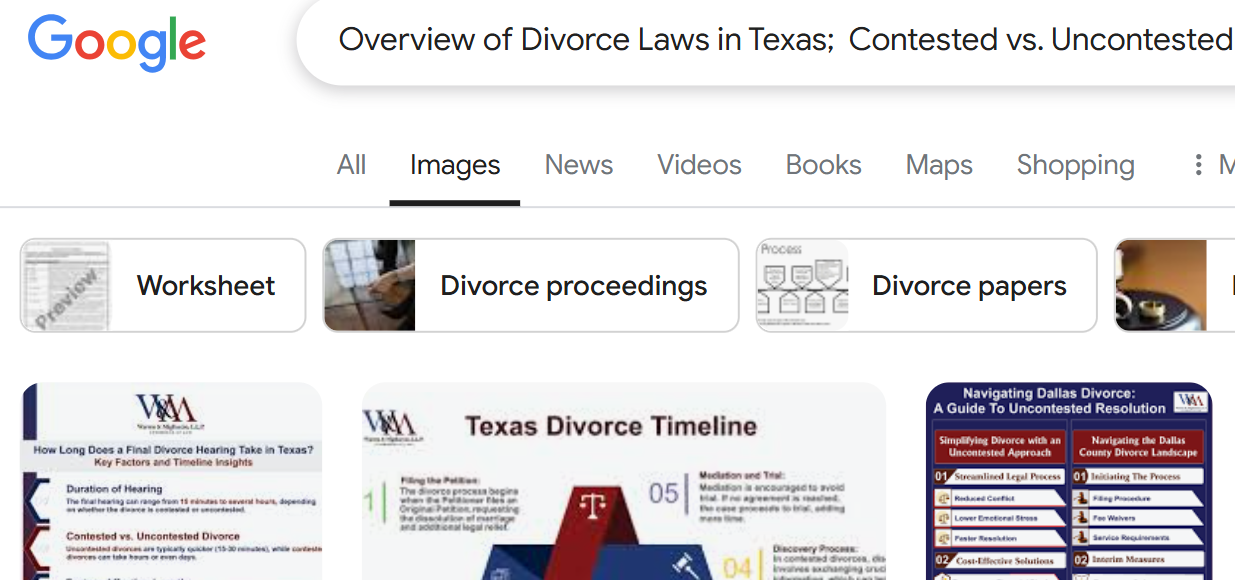
No-Fault State
Texas is a no-fault divorce state. This means you don’t have to prove wrongdoing like adultery or cruelty to file for divorce. Often, spouses claim the marriage is “insupportable” due to conflict or discord. However, Texas law allows fault-based grounds—such as adultery, cruelty, felony conviction, or abandonment—if they’re relevant to the division of assets or other key aspects of the divorce case.
Related: Understanding Texas Divorce Grounds: A Simple Guide for Couples
Residency Requirements
To file a divorce petition in Texas:
- One spouse must have lived in Texas for at least six months before filing.
- One spouse must have lived in the county where the petition is filed for at least 90 days.
60-Day Waiting Period
Texas requires a 60-day “cooling off” period after filing before finalizing a divorce decree (with limited exceptions). During this waiting period, spouses negotiate and reach agreements on the terms of the divorce, whether contested or uncontested. A contested divorce will ensue when spouses cannot agree on key issues during the waiting period.
Texas Divorce Roadmap: Your Step-by-Step Journey
This roadmap provides a clickable overview of the typical divorce process in Texas. Each section expands when clicked, offering practical details—from confirming residency to finalizing the decree.
How to Use: Scroll down, click on any heading for an expanded explanation, and gain clarity on both uncontested and contested paths.
Created by Warren & Migliaccio
1. Confirm Residency Requirements
Before filing for divorce in Texas, at least one spouse must have lived in the state for 6 months, and in the specific county for 90 days.
Tip: Make sure these requirements are met—or you may have to wait before filing.
2. File a Divorce Petition
You (the Petitioner) submit the divorce petition in the appropriate county. Then your spouse (the Respondent) is served the papers and typically has 20 days + the following Monday to respond.
Uncontested: Your spouse might sign a Waiver of Service if cooperative.
Contested: Your spouse files an Answer or Counterpetition, disputing major issues.
3. Observe the 60-Day Waiting Period
By Texas law, there’s a 60-day “cooling-off” period after filing. Use this time for negotiations, mediation, or drafting a marital settlement agreement if aiming for an uncontested divorce.
If spouses still disagree on key issues after 60 days, the divorce may become contested.
4. Attempt Settlement or Begin Discovery
Uncontested: If both parties agree on property division, custody, and support, you can finalize quickly.
Contested: Discovery (financial documents, interrogatories, depositions) begins. Mediation may be required to encourage a settlement.
This phase can vary widely, depending on how cooperative both sides are.
5. Final Decree, Hearing, or Trial
If uncontested, simply submit the Final Decree to the judge after the waiting period. Often, no formal court appearance is needed if all documents are in order.
If contested, any unresolved issues go before a judge or jury at trial. This can significantly increase both time and legal costs.
Tip: Settling out of court often saves money and stress for everyone involved.
Uncontested Divorce: A Path to Collaboration
Definition
An uncontested divorce occurs when both spouses agree on all major issues, including:
- Division of marital assets and debts
- Child custody arrangements and visitation schedules
- Child support and spousal support (if any)
When there’s agreement, court involvement is minimal and the process is faster. However, you should still consult with an experienced divorce attorney to make sure all legal requirements are met in an uncontested divorce.
Key Benefits
- Lower Costs: Fewer hours billed by a divorce lawyer and lower legal fees.
- Faster Timeline: Many uncontested divorces can be finalized shortly after the 60-day waiting period.
- Reduced Stress: Amicable divorce spares kids from long conflict and everyone’s emotional well-being. Couples in uncontested divorces are more likely to be satisfied with the outcomes of their proceedings, as they have more control over the terms and resolutions.
Multiple sources say up to 90% of divorces filed in Texas are uncontested. This means most people prefer to resolve things amicably if possible.
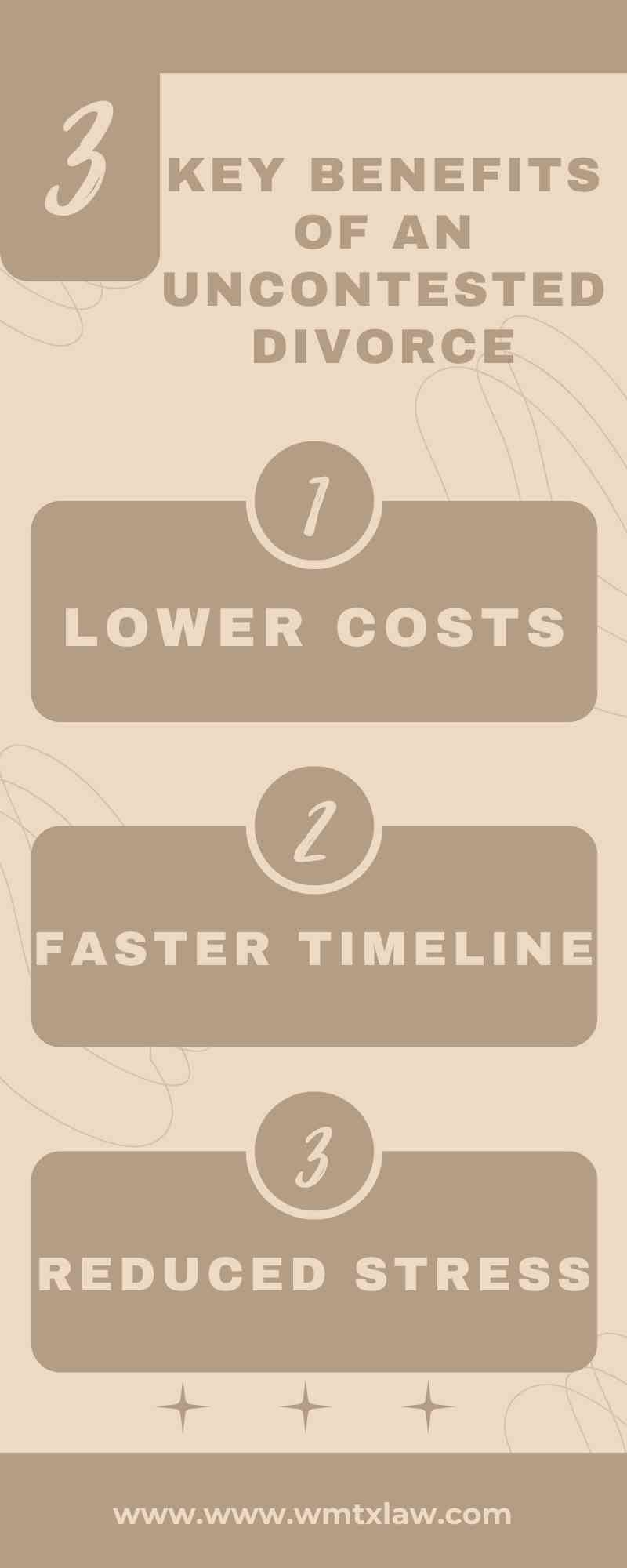
Steps for an Uncontested Divorce
Pre-Filing Discussion
Sit down (with or without divorce mediation) to sort out property, custody arrangements, and other divorce terms. Draft a marital settlement agreement covering all relevant issues.
Joint Petition or Agreed Filing
One spouse files the divorce petition, and the other spouse signs a Waiver of Service or similarly cooperative document.
Draft Final Decree
Incorporate every agreed-upon term—such as the division of property, debt allocation, custody schedules, and support obligations—into the divorce decree.
Court Approval
Submit the final divorce decree to the family court after the 60-day waiting period. If all terms are in order, a judge can sign off without a formal court hearing.
Related Guide: What Happens After a Judge Signs the Divorce Decree?

Contested Divorce: When Disputes Persist
Definition
A contested divorce occurs when spouses can’t agree on one or more big issues (e.g. custody arrangements, division of marital assets or spousal support). These disagreements require more legal representation, more steps in the divorce process, and possibly depositions or a trial in family court. A skilled divorce attorney is highly experienced in handling contested divorces and will guide you through the entire process.
Common Reasons for Contention
- Custody Arrangements: Disputes over parenting schedules, sole/joint custody, or significant decision-making.
- Division of Assets: Especially complex if high-value marital assets—like family businesses or extensive real estate—are at stake.
- Spousal Support: One spouse may request alimony or contest the duration and amount.
- Domestic Violence: Allegations of abuse can add complexity, often requiring evidence and further legal intervention.
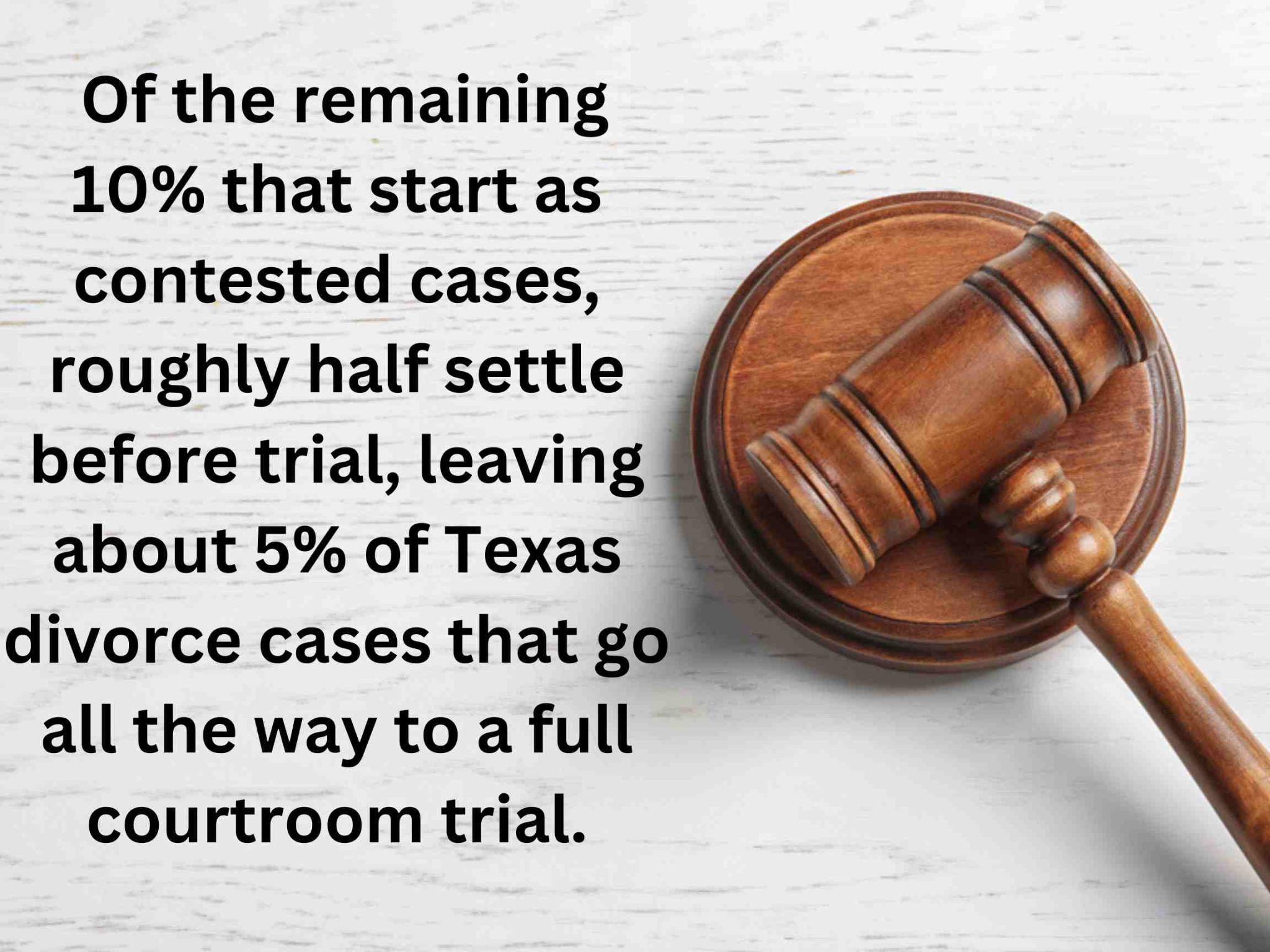
Steps for a Contested Divorce
Filing & Serving Petition
One spouse, called the Petitioner, files the divorce petition; the other spouse, called the Respondent, must be served the papers. The Respondent typically has 20 days (plus the following Monday) to respond. If the Respondent does not respond to the divorce papers, the court may grant the spouse who filed for divorce a default judgment.
Related: How to Respond to Divorce Papers in Texas: Step-by-Step Guide
Discovery Phase
Both parties exchange financial and legal documents, answer interrogatories, and possibly conduct depositions to gather evidence about marital assets, income, and more. This phase can be time-consuming and expensive.
Mediation/Settlement Attempts
Texas courts often mandate divorce mediation before a trial. If mediation is successful, both parties avoid the need for prolonged, public divorce proceedings by signing a marital settlement agreement.
Trial
If mediation fails, unresolved disputes are presented in court hearings. A judge (or jury, in some cases) decides on the division of property, custody arrangements, and other terms of the divorce. Trials can span days, weeks, or months depending on complexity.
Downsides of Contested Divorces
Emotional Strain: Prolonged conflict can affect mental health, making it difficult for both spouses and children to move forward.
Higher Costs: Divorce proceedings, including depositions and expert witnesses, often lead to legal fees exceeding $10,000–$30,000 or more.
Longer Timelines: Cases may extend for a year or more, particularly if disagreements over marital assets or custody arrangements remain unresolved.
Comparative Snapshot: Contested vs. Uncontested Divorces
Contested vs. Uncontested Divorces
| Feature | Uncontested Divorce | Contested Divorce |
|---|---|---|
| Agreement | Spouses agree on all terms of the divorce. | Disputes require intervention from family court. |
| Cost | Typically $1,000–$3,000 (sometimes less). | Often exceeds $10,000–$30,000 due to litigation. |
| Timeline | 1–3 months after the 60-day waiting period. | Several months to years, depending on complexity. |
| Emotional Toll | Lower—collaborative and amicable process. | Higher—stress from disputes and legal battles. |
| Legal Steps | Minimal court involvement, no trial. | Extensive legal process, often requires a trial. |
Case Study: When Agreement Falls Apart
Pollard v. Merkel, 114 S.W.3d 695 (Tex. App.—Dallas 2003, pet. denied) demonstrates the stark difference between contested and uncontested divorces in Texas. After 28 years of marriage, what began as a standard divorce in 1992 spiraled into 16 years of litigation when the parties repudiated their mediated settlement agreement. The case involved multiple law firms, malpractice claims, jury trials, and appeals—ultimately ending without a final decree when one party died in 2008. While uncontested divorces typically cost $500-$3,000 and conclude within 3-6 months, this contested case likely cost hundreds of thousands in legal fees. The case illustrates why Texas courts strongly enforce mediated settlement agreements under Family Code § 6.602 and serves as a cautionary tale: parties who abandon agreements risk decades of costly litigation instead of the quick, affordable resolution available through uncontested proceedings.
Citation URL: https://case-law.vlex.com/vid/pollard-v-merkel-no-885656615
Time and Cost Considerations
Costs
- Uncontested Divorce: Lower costs due to limited court involvement and reduced legal fees.
- Contested Divorce: Higher costs from divorce mediation, expert witnesses, and prolonged legal representation.
Timelines
- Uncontested Divorce: Often finalized within 60–90 days after filing.
- Contested Divorce: Can take 6–12 months or more depending on the complexity of the divorce case.
Emotional and Family Impacts
Children’s Well-Being
- Uncontested Divorce: Reduced conflict benefits children by providing stability and reducing anxiety.
- Contested Divorce: Ongoing disputes in divorce proceedings can harm children’s sense of security and affect family dynamics.
Mental Health
- Prolonged litigation often exacerbates stress for both parties. Counseling or therapy can help families process the emotional impact of the legal process.
Asset Division and Community Property
Community Property Laws
You may wonder what you are entitled to in a Texas divorce. Texas is a community property state, therefore most assets and debts acquired during the marriage are split 50/50 unless otherwise agreed upon. Exceptions are gifts, inheritances or separate property acquired before marriage.
High-Value Assets
- Business Interests: May require expert analysis or valuations.
- Retirement Accounts: Divided using Qualified Domestic Relations Orders (QDROs) to avoid penalties.
- Real Estate: Often sold, with proceeds divided, or one spouse buys out the other.
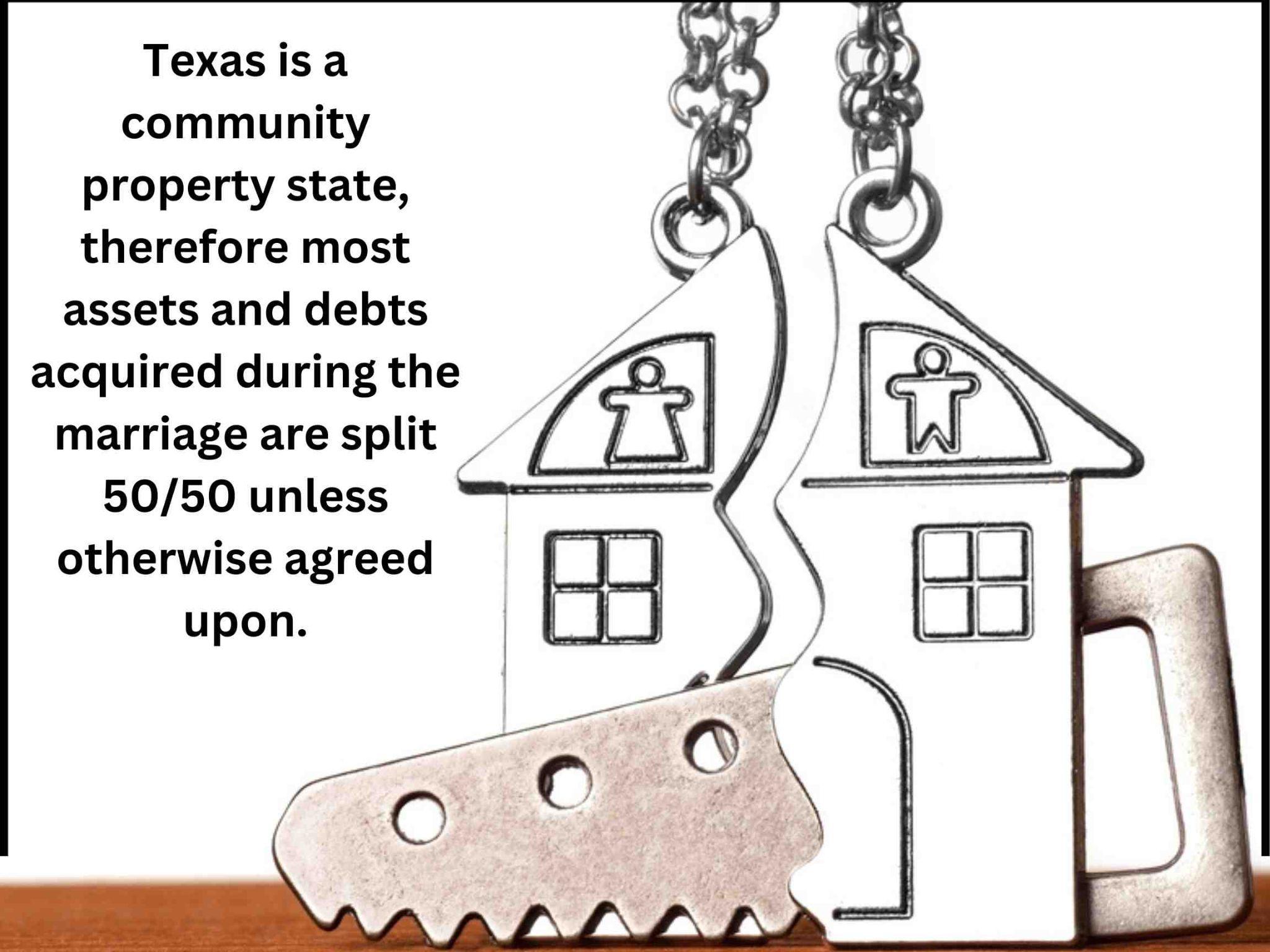
Frequently Asked Questions
Costs and Timelines
How much does a contested divorce cost compared to an uncontested divorce in Texas?
A contested divorce typically costs $15,000–$30,000 per spouse in attorney fees, while an uncontested divorce costs $300–$5,000 total.
Cost Breakdown:
- Contested: Attorney fees ($250–$500/hour × 60–100+ hours), expert witnesses ($2,000–$10,000), mediation ($500–$5,000), court reporter fees ($100–$300/hour)
- Uncontested: Filing fees ($300–$500), attorney flat fee ($750–$2,500), document preparation only
Complex contested cases involving business valuations or custody battles can exceed $50,000–$100,000 in total costs.
How long does an uncontested divorce take in Texas?
An uncontested divorce can be finalized 60–90 days after filing, immediately following Texas’s mandatory 60-day waiting period.
Timeline Breakdown:
- Days 1–20: File petition and obtain waiver of service
- Days 21–60: Mandatory waiting period
- Day 61+: Submit final decree for judge’s signature
Total: 60–90 days (up to 120 days in busy counties).
How long does a contested divorce take in Texas?
A contested divorce typically takes 6 months to 2 years, with most cases requiring 9–12 months from filing to final decree.
Timeline Factors:
- Mandatory 60-day waiting period
- Discovery phase: 3–6 months
- Court-ordered mediation: 1–3 months
- Trial setting: 6–12 months wait
- Complex property or custody issues: Add 6+ months
Shifting Between Contested and Uncontested
Can a contested divorce become uncontested during the process?
Yes, a contested divorce can become uncontested at any point before trial if spouses reach agreement on all disputed issues. Over 70% of mediated cases reach full settlement.
Common Resolution Methods:
- Court-ordered mediation with neutral mediator
- Settlement conferences between attorneys
- Direct spouse negotiations
- Collaborative divorce process
Converting to uncontested status typically saves $10,000–$20,000 in legal fees and reduces timeline from years to months.
When to Choose Contested Divorce
When should I choose a contested divorce?
A contested divorce becomes necessary when fundamental disagreements cannot be resolved through negotiation, particularly when protecting your rights or children’s welfare requires court intervention.
Consider contested divorce when:
- Safety concerns exist (domestic violence, substance abuse, child endangerment)
- Hidden assets suspected (undisclosed income, accounts, or property)
- Complex property division (business valuations, inheritance disputes)
- Child custody disputes (parenting time, decision-making)
- Unreasonable demands (excessive spousal support claims or refusal to compromise)
Default and Court Involvement
What happens if my spouse doesn’t respond to divorce papers in Texas?
If your spouse fails to respond within 20 days plus the following Monday after service, you can request a default judgment from the court.
Default Process:
- Verify proper service was completed
- Wait for response deadline to expire
- File default motion and military status affidavit
- Schedule default hearing (no notice to spouse required)
- Obtain default judgment based on your petition
The default process typically takes 30–45 days after the response deadline. Courts still review agreements for fairness, especially regarding children.
Can you get a divorce without going to court in Texas?
Yes, if both parties agree on all terms (uncontested divorce), you can finalize the divorce without any court appearance.
Requirements for No-Court Divorce:
- Complete agreement on all issues
- Proper waiver of service from spouse
- Submit affidavit of testimony instead of appearing
- All documents properly executed
Some counties require brief “prove-up” hearings (5–10 minutes) even for agreed cases. Many Texas courts now offer virtual hearings as an alternative.
Special Concerns
Why do abusive spouses delay signing divorce papers?
Delaying divorce papers is a control tactic used by abusive spouses to maintain power and create ongoing emotional and financial stress.
Common Motivations:
- Maintaining control over their victim
- Financial manipulation and draining resources
- Emotional punishment through legal harassment
- Forcing unfavorable settlement terms
- Refusing to accept the relationship has ended
Legal remedies include: default judgment proceedings, protective orders, emergency temporary orders, and expedited hearings for safety concerns.
Legal Representation
Do I need a lawyer for an uncontested divorce in Texas?
While not legally required, consulting with a divorce attorney is strongly recommended to ensure proper documentation and protection of your rights.
Benefits of Legal Representation:
- Proper asset valuation and tax implications
- Enforceable separation agreements
- Correct handling of retirement accounts (QDROs)
- Avoiding costly future modifications
Cost Options:
- DIY: $300–$500 (filing fees only) – highest risk
- Limited scope: $500–$1,500 for document review
- Full representation: $1,500–$5,000 for complete uncontested case
Residency and Property Division
What are the residency requirements for filing divorce in Texas?
To file for divorce in Texas, one spouse must have lived in Texas for at least 6 months and in the specific county for at least 90 days.
Requirements:
- Continuous and uninterrupted
- Immediately preceding the filing date
- Verified through documentation (driver’s license, utility bills, employment records)
Military members stationed in Texas can use their time on base to meet residency requirements.
How is property divided in a contested divorce in Texas?
Texas divides community property in a “just and right” manner, which isn’t always 50/50 but considers multiple factors.
Division Factors:
- Earning capacities and education levels
- Health and age of spouses
- Fault in the marriage breakup
- Custody of children
- Size of separate estates
- Future employability
Property Types:
- Community Property: All assets/debts acquired during marriage
- Separate Property: Pre-marriage assets, inheritances, gifts, personal injury settlements
Judges may award 60–70% to one spouse if significant fault exists or substantial earning disparities are present.
Partial Agreement Cases
What if we agree on everything except child custody?
Any unresolved dispute over child custody makes the divorce contested in that area, even if you agree on all other issues.
Result:
- Property and financial matters may proceed uncontested
- Custody issues require mediation or court hearing
- Partial agreements can reduce overall costs
- Texas courts prioritize child’s best interests
This “partial contest” approach can save money compared to fully contested cases while ensuring proper custody determination.
Conclusion
Deciding between a contested and uncontested divorce in Texas is an important choice. Here are some factors to consider:
- Think About Your Situation: Each divorce is different. Talk to a family lawyer in Texas to understand your options.
- Child Custody and Business Interests: These can affect whether your divorce contested and uncontested.
- High Net Worth: If you have many assets, it may be harder and take longer to finalize the divorce.
- Waiting Period: Remember, there’s a 60-day waiting period after filing before a judge can finalize the divorce.
- Complex Situations: Issues like criminal charges can complicate the divorce process.
This information is for informational purposes only. It is not legal advice. Always speak with an experienced Texas divorce attorney specific questions about contested vs. uncontested divorce in Texas.
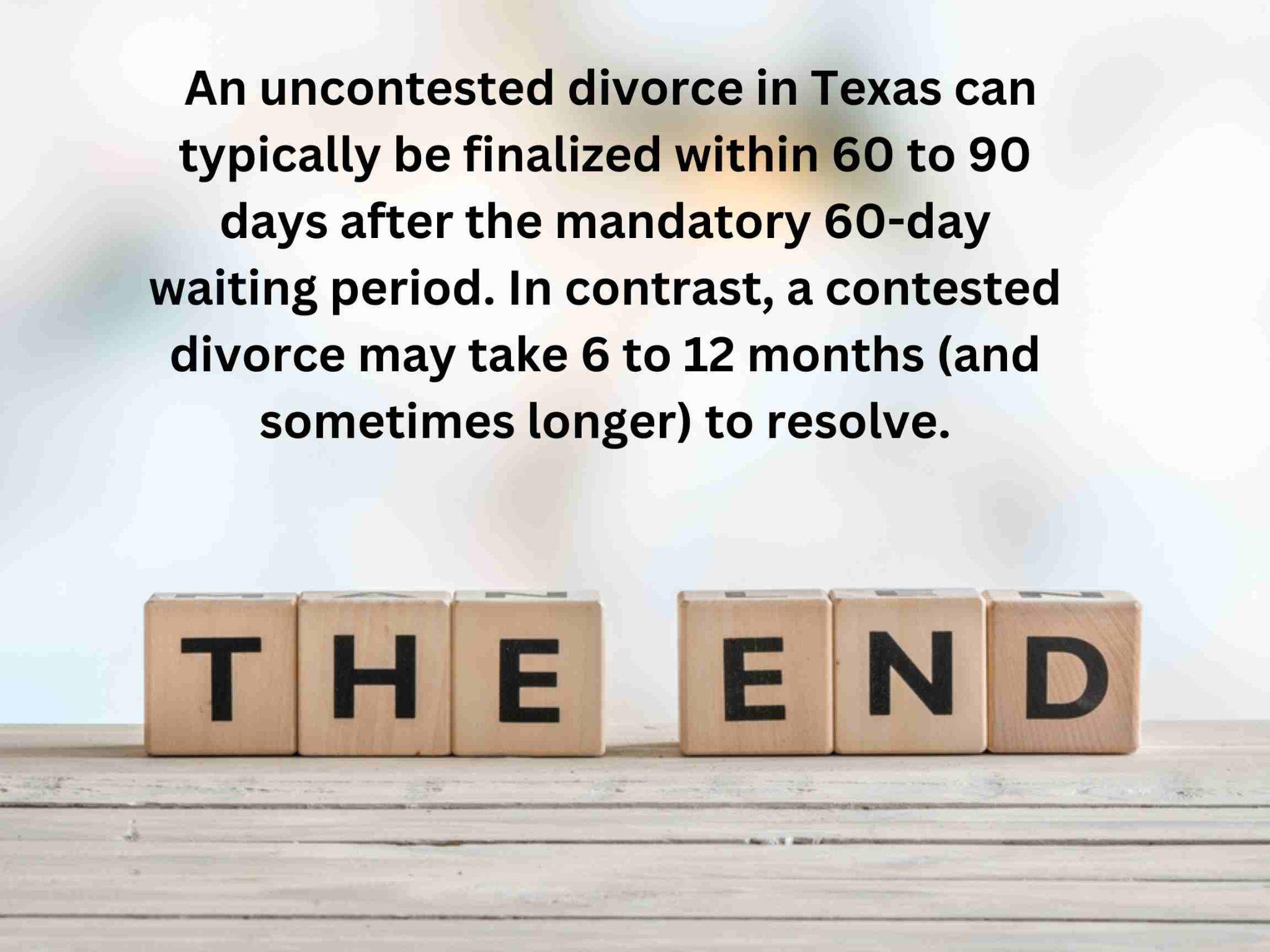
Will Sean Reconsider his Desire to See his Spouse in Court?
“There are good reasons not to fight it out in court,” Sean said, showing he was starting to get it. “I’ve been picturing the court case, seeing her squirm. It’s been on my mind constantly.”
“I get it, Sean. Divorce can stir up a lot of anger. But what do you really want? What would make the next chapter of your life smoother?” I asked.
“I just want this over quickly and to keep as much money as possible,” he said. “Embarrassing her in front of the judge sounds nice, but how long will that take, and how much will it cost?”
“Great questions,” I replied. “It’ll definitely take longer and cost more than trying to work it out without court. I can help you negotiate the important terms, though.”
“You can help with that? I’d prefer not to talk to her if I don’t have to,” he said. “We don’t have kids or a house, just the down payment savings. She makes more, so I don’t think she’s entitled to spousal support, and I won’t ask for any. The judge won’t care about who’s at fault unless it affects the settlement, right?”
“Exactly, you’re thinking clearly now,” I said. “I’m here for you, whether we go uncontested or contested.”
“Thanks, Chris. I’m glad you helped me see things differently. Now I’m imagining getting this over with quickly, with less stress and money spent,” he said.
“We’ll try to avoid court, but if you start fighting over assets, we may have to go contested. I’m glad you understand both options now,” I told him.

Schedule a Consultation With Our Firm to Learn About the Differences Between a Contested and Uncontested Divorce in Texas
Wondering if you’ll be able to have an amicable uncontested divorce or if you’ll have to battle it out with your spouse in a contested divorce in Texas can be stressful and challenging, but you do not have to face it alone. Our team of experienced attorneys is ready to provide you with the guidance, support, and legal advocacy you need during these challenging times.
Whether you are wondering if you are headed for a contested or uncontested divorce in Texas,, or navigating other divorce related issues, we are here to help you every step of the way. We welcome you to schedule a consultation to discuss your situation and case objectives. We can answer your legal questions and discuss how we can help you move forward. Call our law office at (888) 584-9614 or contact us online to schedule your consultation.
Disclaimer: This is not legal advice and only for informational purposes. Always contact an experienced Texas family lawyer or attorney if you need clarification.

